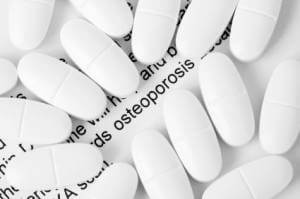One question I often hear from my clients is “How much calcium do I need to take every day for my bones?”
The hidden assumption in that question is this: “you have to take a supplement to get enough calcium for your bones.” That seems to be the philosophy of most consumers and healthcare practitioners, but is it true?
The answer is a resounding no. In fact, women who get their calcium from food have higher bone mineral density than women who just take supplements.
This is true even though women relying on supplements actually take in more milligrams of calcium than women relying on calcium-rich foods.
How does less calcium equal more?
 So why does less equal more when it comes to getting calcium from your food? According to a 2007 study from the University of Washington in St. Louis, it may have to do with all the other great things we get from natural foods besides just calcium.
So why does less equal more when it comes to getting calcium from your food? According to a 2007 study from the University of Washington in St. Louis, it may have to do with all the other great things we get from natural foods besides just calcium.
For instance, we can’t get calcium from our intestines to our bones without vitamin D. We can’t absorb it from our blood to our bones without magnesium. When we eat whole foods, we’re taking in other vitamins and minerals that we need (there are 20!) for strong bones.
Researchers also explained that women who get their calcium from food have stronger bones because our bodies can only absorb about 35 percent of the calcium in most supplements.
Some forms of calcium supplements are worse than others. For instance, calcium carbonate should be taken with a meal so stomach acid can break it down to be absorbed. If you take calcium carbonate between meals or on an empty stomach, you won’t be able to absorb as much.
Eat Bones for Your Bones
Dairy foods are the most popular source of dietary calcium. Milk products have the highest concentration of calcium per serving and it is easily absorbed by your body. But milk may not be the best choice for other reasons, including increased rates of fracture.
One of the best and most frequently overlooked dietary sources of calcium are the bones and shells of fish, fowl and livestock. Try sardines, anchovies, soft-shell crabs and oysters, and don’t forget to make a rich stock from chicken or beef bones.
Dark green leafy vegetables are another good source but some are better than others when it comes to calcium absorption. Spinach and Swiss chard contain oxalates which bind to calcium and prevent our bodies from absorbing it.
Luckily there are many greens with low levels of oxalates that provide a good source of calcium. They include kale, collards, bok choy, mustard greens and dandelion greens.
Bottom line? Calcium in your food gives you more bang for your buck, so to speak, because your body can use it more easily.
What will it be for your bones - a chalky pill or a plate full of wholesome foods?
From my delicious bones to yours,
Irma
Resources:
Dietary calcium is better than supplements at protecting bone health https://news.wustl.edu/news/Pages/9577.aspx
NIH Dietary Supplement Fact Sheet https://ods.od.nih.gov/factsheets/calcium/
What are oxalates… https://whfoods.org/genpage.php?dbid=48&tname=george
Non-Dairy Sources of Calcium https://www.ellenskitchen.com/faqs/calcium.html
Let Me Support Your Bones
Get Customized In-Depth Private Session
Book a Private Coaching with Irma Now
Join Our Amazing Bone Tribe Community
Get the support & information you need to live fearlessly with your bones diagnosis
From my bones to yours,
Irma Jennings, INHC
Your Holistic Bone Coach
[email protected]

